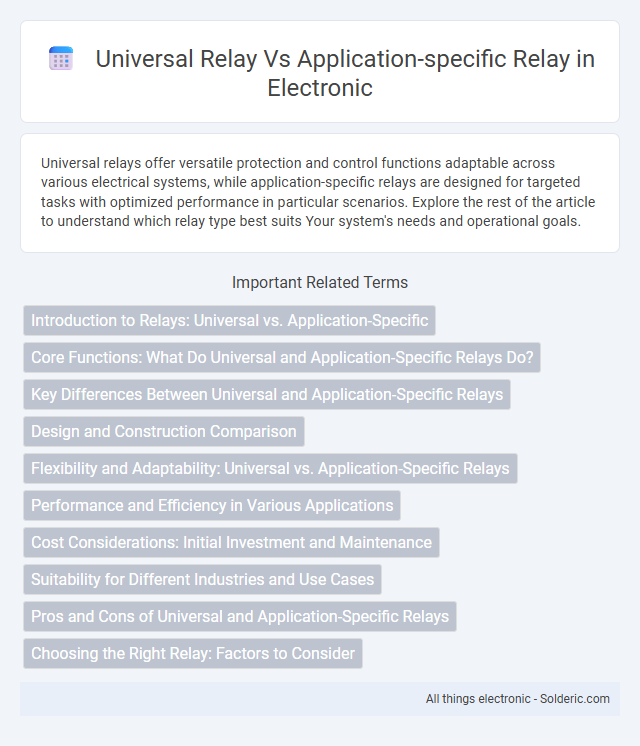Universal relays offer versatile protection and control functions adaptable across various electrical systems, while application-specific relays are designed for targeted tasks with optimized performance in particular scenarios. Explore the rest of the article to understand which relay type best suits Your system's needs and operational goals.
Comparison Table
| Feature | Universal Relay | Application-Specific Relay |
|---|---|---|
| Definition | General-purpose relay designed to support multiple communication protocols and applications. | Relay tailored to specific application requirements with optimized functionality. |
| Flexibility | High flexibility, supports various protocols and network types. | Limited flexibility, optimized for particular use cases. |
| Performance | Moderate performance across different applications. | High performance due to focused design. |
| Compatibility | Compatible with multiple platforms and devices. | Compatibility limited to specific platforms or devices. |
| Cost | Generally lower cost due to wide usability. | Potentially higher cost for specialized hardware/software. |
| Use Cases | Ideal for diverse network environments and evolving requirements. | Best for dedicated systems with fixed protocols and performance needs. |
Introduction to Relays: Universal vs. Application-Specific
Universal relays offer versatile protection across various electrical systems with programmable features suitable for multiple applications, enhancing flexibility and cost-effectiveness. Application-specific relays are designed with tailored functions and settings optimized for particular equipment or scenarios, providing precise performance and reliability. Your choice depends on balancing adaptability and specialized protection requirements in your electrical infrastructure.
Core Functions: What Do Universal and Application-Specific Relays Do?
Universal relays provide versatile switching functions suitable for a wide range of applications, including power control, signal routing, and isolation across various devices. Application-specific relays are designed to perform specialized tasks tailored to industry needs such as automotive control systems, industrial automation, or telecommunications with optimized performance parameters. Core functions of universal relays emphasize compatibility and adaptability, while application-specific relays prioritize efficiency and precision for targeted operational environments.
Key Differences Between Universal and Application-Specific Relays
Universal relays offer broad compatibility across multiple applications, featuring adjustable parameters to accommodate varying control requirements, whereas application-specific relays are engineered with fixed settings tailored for precise functions like motor protection or time delay. Universal relays provide flexibility in control systems, reducing inventory needs by replacing several specialized devices, while application-specific relays optimize performance and reliability in dedicated tasks. The trade-off involves universal relays offering versatility and ease of integration, contrasted with the enhanced efficiency and specialization found in application-specific models.
Design and Construction Comparison
Universal relays feature versatile designs with standardized components, enabling broad compatibility across multiple applications and environments. Application-specific relays are engineered with tailored construction to meet precise operational requirements, often incorporating specialized materials or contact configurations to optimize performance. Your choice influences system reliability and integration, as universal relays prioritize adaptability, while application-specific relays excel in targeted functionality.
Flexibility and Adaptability: Universal vs. Application-Specific Relays
Universal relays offer high flexibility and adaptability by supporting multiple protection functions and communication protocols in a single device, enabling easier integration across various electrical systems. Application-specific relays are optimized for particular tasks, providing precise and reliable performance but limited to predefined functions and configurations. The choice between universal and application-specific relays depends on the need for versatility versus specialized protection in electrical network management.
Performance and Efficiency in Various Applications
Universal relays offer versatile performance across multiple applications by accommodating diverse input signals and control schemes, enhancing operational flexibility. Application-specific relays are optimized for particular tasks, delivering superior efficiency and faster response times in targeted environments such as motor control or protective switching. Selecting between universal and application-specific relays depends on balancing the need for adaptability against the priority of maximum performance and energy efficiency in a given use case.
Cost Considerations: Initial Investment and Maintenance
Universal relays typically involve a higher initial investment due to their advanced programmable features and multifunctional capabilities compared to application-specific relays designed for singular tasks. Maintenance costs for universal relays can be lower over time because their versatility reduces the need for multiple separate devices, streamlining inventory and service procedures. Application-specific relays may incur lower upfront costs but can result in higher long-term expenses due to limited functionality and increased complexity in managing multiple types of relays for different applications.
Suitability for Different Industries and Use Cases
Universal relays offer broad compatibility across various industries, making them ideal for general-purpose applications where flexibility is key, such as HVAC systems, industrial automation, and lighting controls. Application-specific relays are engineered for specialized tasks with optimized performance, reliability, and safety features tailored to sectors like automotive, telecommunications, or medical devices. Your choice depends on whether you need versatile use or precise functionality suited to specific industry standards and operational demands.
Pros and Cons of Universal and Application-Specific Relays
Universal relays offer broad compatibility across multiple applications, reducing inventory complexity and cost, but may sacrifice optimized performance for certain tasks. Application-specific relays deliver tailored functionality and higher efficiency for specialized needs, though they often require increased investment and limited flexibility. Choosing between them depends on Your priorities for versatility versus precision and budget constraints.
Choosing the Right Relay: Factors to Consider
Choosing the right relay involves evaluating factors such as voltage and current ratings, switching speed, and environmental conditions. Universal relays offer broad compatibility for multiple applications but may sacrifice optimization in specific functions. Application-specific relays deliver tailored performance for specialized tasks, enhancing efficiency and reliability in defined operational contexts.
Universal relay vs application-specific relay Infographic

 solderic.com
solderic.com